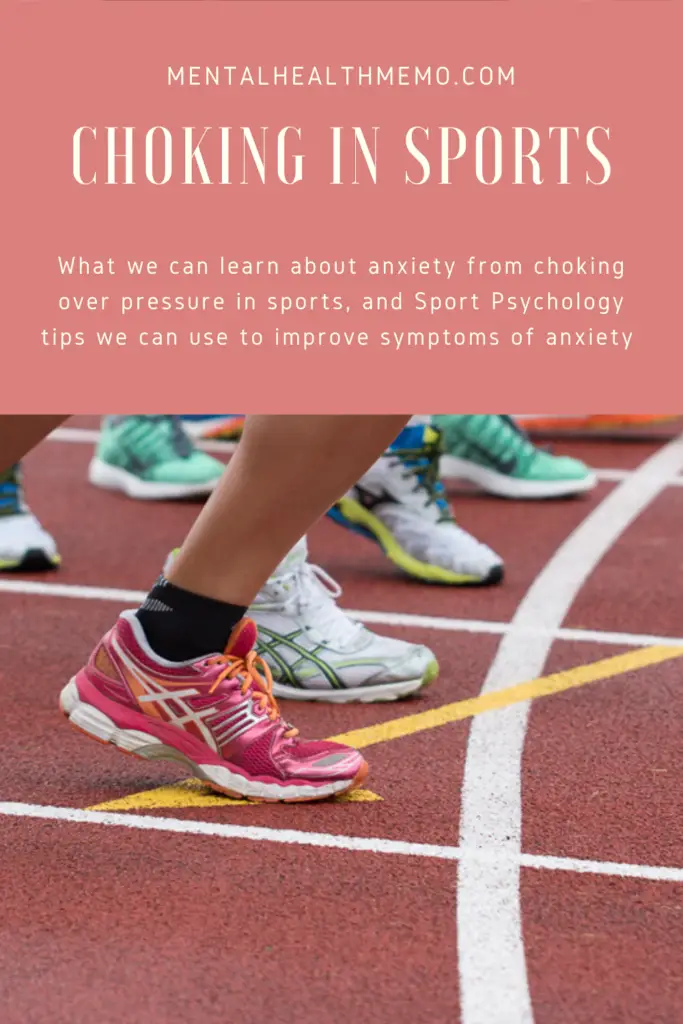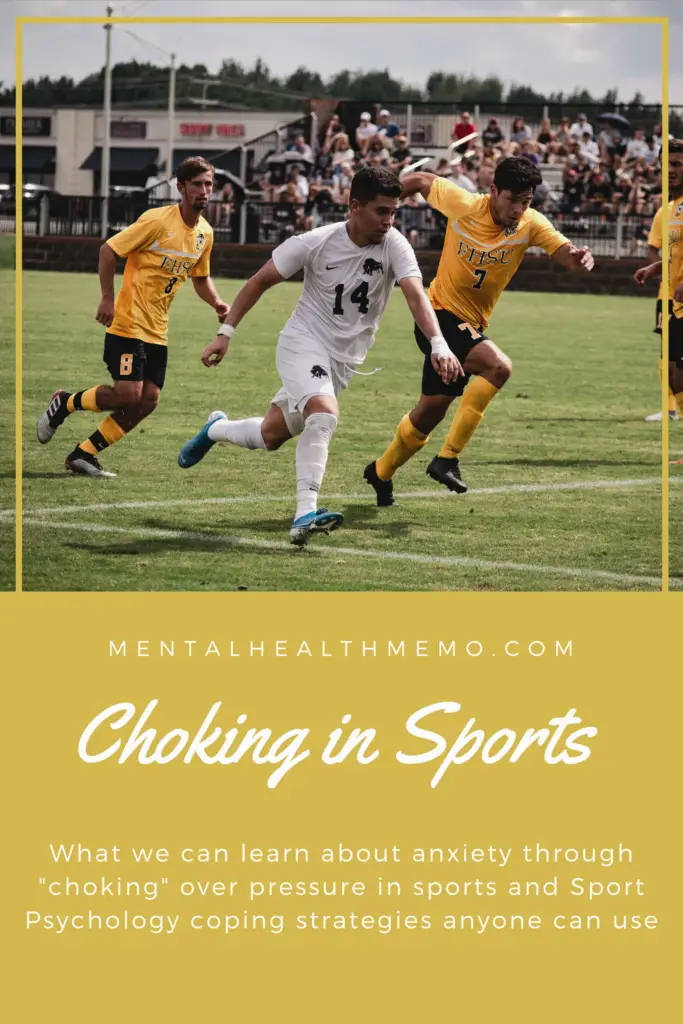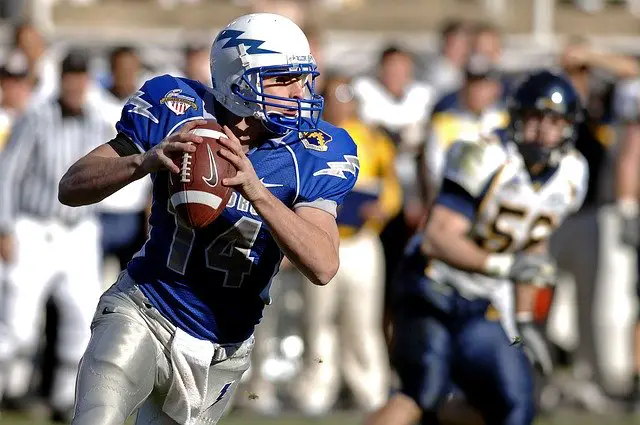
Pin it!
Table of Contents
Author Bio:
Charlotte is a freelance writer and creator of the blog The Healthy Goal Setter. She writes about self-care, mental health, and personal development, often drawing from her expertise in Sport Psychology.

What is Choking in Sports?
We all know the feeling – when you have to stand up in front of your class and deliver a presentation, or the nervousness of going on a first date. The feeling of anxiety is one we’re all familiar with, and generally speaking, the stomach pains and racing heart that we experience when faced with a challenge can ease off with time and we are able to carry on as normal.
But if you suffer from anxiety on a more acute level, such as experiencing panic attacks or having a fear of certain situations, you might often feel like you are about to stand up in front of your whole school and sing a power ballad – even if the scenario is something seemingly trivial, like going to the shops, or to a friends house. Sometimes everyday anxiety can feel like we’re about to take on the challenge of a lifetime at any moment.
Which is why I want to talk about elite sport, and choking in sports, in particular. Professional athletes are faced with the pressure to perform their very best every time they compete in their particular sport. Sometimes, the worry and anxiety that comes with the pressure to perform can disrupt an athlete so much that they completely flunk at the key moment.
For example, in the 1995 Eastern Conference Semi-Finals, Michael Jordan had the ball stolen from him in the last 20 seconds of the game for the opposing team to score the winning shot.

Athletes choke because of worries and anxiety around their current situation – it’s as simple as that. And even though it’s on a bigger scale, it’s the same worries and anxieties that we may feel when presenting to the class or talking to strangers. It can feel just as big as taking the winning shot in the finals.
So I want to share with you why choking happens in sport, and how athletes work to overcome this. By learning about how athletes deal with choking, we can discover some techniques that those of you with any kind of anxiety can use when faced with the overwhelming fear that you have to perform in some way.
The Research Behind Choking in Sports
Sport Psychology research suggests that there are two main reasons why athletes might choke under pressure – distraction and self-focus:
Distraction
Distraction might occur due to something internal that’s going on for an athlete – like worrying about their performance, the score, or someone on the opposing team. Athletes might also get distracted by something going on around them- like the hum of the crowd, or someone booing at them. This causes them to lose focus at a key time, and fluff up at the crucial moment.
You might have had this feeling before even in everyday situations – if you’re anxious about being alone in the house, for example, you might get distracted by strange or weird noises or shadows on the wall. Or if you think someone is bored during your presentation, you may stumble over your words or lose your train of thought.
Self-focus
Self-focus is a little different. If you have ever become pretty good at any motor skill, even if it’s something like playing the piano, you’ll know that at first, you feel like a deer standing up for the first time. You flail about, your body doesn’t move in the way you want it to, and everything feels pretty awkward. Once you practice more, your motor skills become more effortless and fluid.
However, when we get nervous about messing up our skill, we can revert back to moving just like we did when we were a novice – suddenly everything feels clunky and weird again, and we perform as if we’ve suddenly forgotten how to do that thing we’ve perfected! Again, maybe you’ve had the feeling before where you’re so nervous and anxious you’ve even forgotten how to walk or breathe evenly and deeply. At a party, you might have trouble remembering how to hold a conversation. Sometimes we can get clumsy, our hands don’t work properly and we drop things when we’re under pressure!

Techniques for Fixing Self-Focus & Distraction, and How to Apply Them to Anxiety:
Task-relevant cues
With that in mind, part of athletes’ training is how to minimize or avoid situations where they get distracted easily or focus too much on their movements:
Athletes learn how to create task-relevant cues, to keep them focused on the situation at hand rather than getting distracted by something irrelevant. For example, they might create cue-phrases to bring them back to the moment, like ‘I’m shooting toward the left side of the goal’, or ‘I’m coming to the 400m mark of the race’. Phrases such as this force the athlete to focus on the skill they have to execute, and they often practice this in training. This could also be a cue like deep breathing, or counting swimming strokes.
You can also create task-relevant cues to keep you on track if you’re in a pressurized situation. If it’s a presentation, you can literally have cue cards to refer back to if you’re getting distracted by worries or fears. Something I used to do if I was feeling anxious was to keep a little stone in my pocket that I would hold if I wanted to prevent myself from getting distracted by worrying thoughts.
Attend to something other than body movements
Athletes can deal with the issue of self-focus by attending to something completely separate from body movements. This really depends on the particular situation. So if you were a golfer who, when faced with a crucial moment, worried a lot about the mechanics of your golf swing, you might choose to take the attention away from your movements by focusing on something else, like the golf ball, or the green in the distance.
If you were someone who found that you worried a lot about what to say in social situations, you could offer to do something for the host when you arrive at a party – like filling up the bowl of chips or making guacamole. Focusing on a different task can free you from worrying about what to say, and you may find that the conversation flows easier because your attention is taken up with something else.

Acclimatization
Lastly, athletes practice acclimatization to anxiety. So they purposefully put themselves in mildly stressful situations, like in front of a camera, and practice performing their skill. This allows them to deal with micro-levels of anxiety before being confronted with the real thing. We can practice acclimatizing to anxiety too, even with small things.
For example, if you get anxious about being in small spaces, you could practice staying for a short amount of time in a slightly larger space, and practice distracting yourself from feeling fear about the confined space. Make sure to take this in small doses and don’t push yourself too far if your anxiety is acute – it’s slow and steady wins the race.

Summary
As you can see, every situation is different and may require different techniques to alleviate anxiety. Sometimes there is a real pressure to perform, like impressing the boss or passing an exam – and sometimes it’s a pressure we create for ourselves, like social pressure. So have a little play with what might work for your specific performance pressure.
If your anxiety revolves around a phobia or a perceived threat, I’d consider trying the task-relevant cues – this can distract you from irrational worries or irrelevant external cues. If you often forget how to do something or find yourself getting clumsy during anxiety, I’d try the techniques to take attention away from your movements. It’s all dependent on the cause and effect of your anxiety.
And remember, if athletes can perform under immense pressure, so can we – but we may have to practice and persevere to get there!
How do you cope with your anxiety? What happens when you’re faced with pressure to perform?


This was great! I didnt even realize some of the things that were taught to me when playing sports.
Me neither! I learned a lot from this post!
Interesting comparison! I use some acclimitization to soothe my anxiety. Sometimes avoiding my triggers helps, but other times it helps to just DO IT. Even if it’s only a smaller version of it. Thanks for this keen look into anxiety 🙂 Much appreciated!
It’s a really interesting comparison, I completely agree! Thank you for reading!